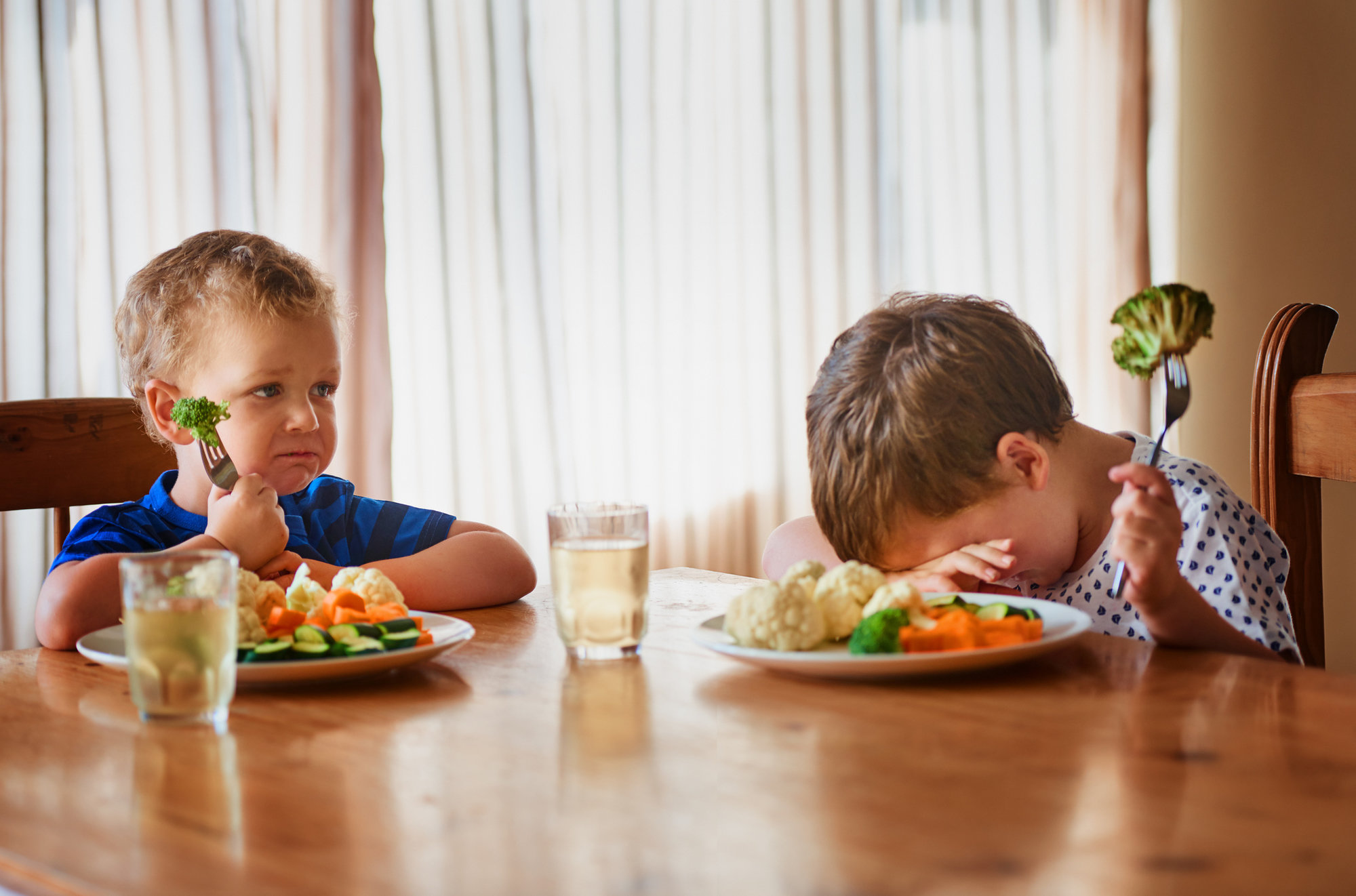
I'm ordering mac and cheese for my 5-year-old twins this past Friday night and I ask the waitress, "Instead of the broccoli or carrots, can they have fries on the side?" I see the question in her eyes over my request. After all, what mom doesn't want her kids to have a serving of healthy veggies with their dinner?
A small fib offered with a smile, "We're celebrating good news," gets our carbo-loaded order on its way. But the truth behind the all beige dinner I just asked for is simple. My kids don't like veggies and I don't care if they eat them, so I'd rather order them something I know they'll enjoy.
I wasn't always so laid-back about my kids' refusal to eat green foods besides Skittles and M&Ms. Like many moms, I used to go to great lengths to try to convince my kids that they had to eat their veggies because I wanted them to grow and be healthy. An irrational fear of scurvy was always in the back of my mind.
I tried the whole, "You have to take at least two bites," game, where you try to get your child to taste veggies — one bite to get their tongue over the fear of a new food, the second to establish whether they actually like it. They refused.
I tried telling them they couldn't leave the table until they tried their vegetables. They took this as an opportunity to discuss the finer plot points of every episode of Paw Patrol ever made, so really, I'm the one who was punished there.
I threatened them: "You'll never be tall enough to ride Space Mountain if you don't eat those carrots." They shrugged and told me they preferred the gentle thrills of It's A Small World anyway.
I went the bribery route and promised them a cookie, cake, ice cream, candy — whatever it would take to get them to eat the green things I put on their plate. And even though this would sometimes lead to them taking a dramatic swallow of spinach or a couple of peas, I started to question whether the sugar and fat they were getting from their "reward" wasn't going to undo any benefit they'd receive from a couple teaspoonfuls of vegetables anyway.
Desperate (and at this point a little bit obsessed) I started trying to hide veggies in other food to get them to eat them that way. But let's be honest, no matter how many chocolate chips you add to the batter, zucchini muffins are always going to taste a bit like grass.
Embedded content: https://media.giphy.com/media/9rY6kKaPXdENq/giphy.gif
Sick of wasting money and time on food that wasn't getting eaten, a few months ago I simply gave up trying to get my kids to eat balanced meals. We were at a point where every dinner was becoming a battle, and I was sick of spending every evening treating them like tiny criminals under the guise of parental care. Unless I'm making veggies for myself and my husband, I don't offer them to kids at all. On nights when my husband works late, they get their bowls of ravioli or nuggets with mac and cheese and applesauce, and I no longer steam a side of peas that's just going to end up getting tossed in the trash anyway. Now there's less stress at dinner and fewer dishes to do.
Turns out my decision to give up the veggie battle isn't a total #momfail.
"Kids are very smart," says Kim Yawitz, a registered dietitian nutritionist at McDaniel Nutrition Therapy in St. Louis. "Forcing them to eat veggies can absolutely make the problem worse. For some kids, it sends the message that veggies are punishment. Others may eat them when forced but use them as bargaining chips. (i.e., "How much cabbage do I need to eat to earn that cookie for dessert?")
Her advice definitely seems to hold true. Ironically, now that I've stopped trying to force the veggie issue, my kids are trying them (if not actually eating them) more than ever before. Because I'm no longer trying to appeal to kid palettes, I make the vegetables I want to eat, and sometimes the kids get curious and ask to try them because there's no pressure on them to eat any or all of what they ask for. One of the boys inhaled the parmesan-crusted zucchini chips I made last week, and if I put roasted broccoli with garlic cheese sauce on the menu, I have to buy double because it turns out he'll eat a whole crown on his own.
Because I was no longer harping on him to try it, my other son was brave enough to figure out he loves olives, mushrooms, and red peppers, and he tells me he wants to try orange peppers when he turns 6 in a few months. Turns out they eat more veggies when I don't put them on their plates automatically.
My parents used to force me to eat my veggies by making me mix them into spoonfuls of other foods I like. Today I can say that I'm a healthy adult who enjoys fruits and veggies (notwithstanding the demon known as eggplant), but during my teen and college years, I struggled with food issues, mainly wanting to have excessive control over what I ate. I'm not willing to follow that same pattern and risk my kids developing an unhealthy relationship with food in the name of trying to make sure they're getting their vitamins and minerals through vegetables.
Although I hope that one day my kids will grow to appreciate a good kale salad the way their mom does, for now, I still my inner helicopter parent by telling myself that they're not going to die from going through a few years without a lot of vegetables on their plates. After all, they still happily chew their gummy vitamins each morning (and are sure to let me know if I forget to hand them out). Plus, so many of the foods they eat on a regular basis such as cereal, bread, snack bars, and even milk are fortified with vitamins to help fill in the gaps.
When I still have those moments of panic that they're never going to grow because of their poor diets, I give them fruit. "Many nutrients found in vegetables can also be found in fruits," registered dietitian Stephaine Hodges tells me. "For example, if a parent wants their child to eat broccoli for its vitamin C content but the child is not willing to eat it, an orange or strawberry could be offered instead." An apple a day, right?
So yes, I'm the mom who doesn't care if her kids turn their noses up at carrots or refuse to try spinach. I think they'll end up healthier because of it.




